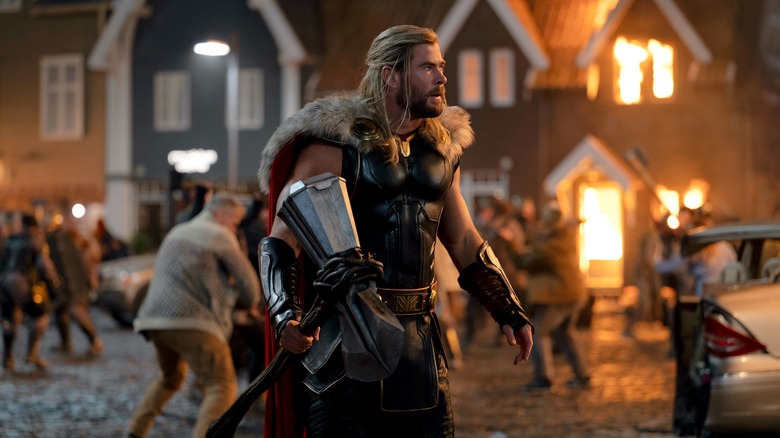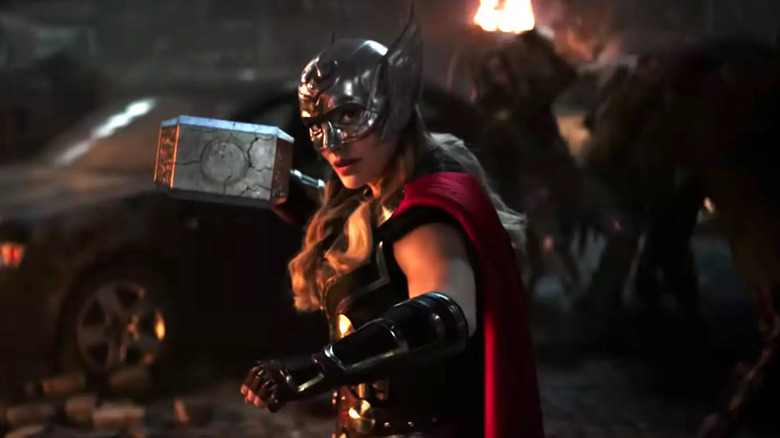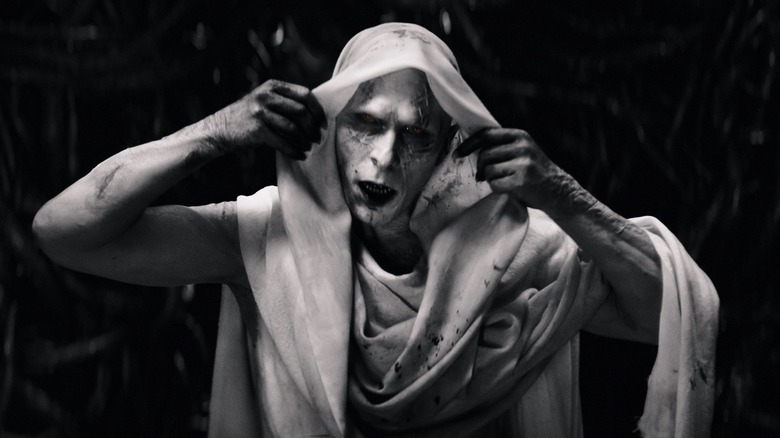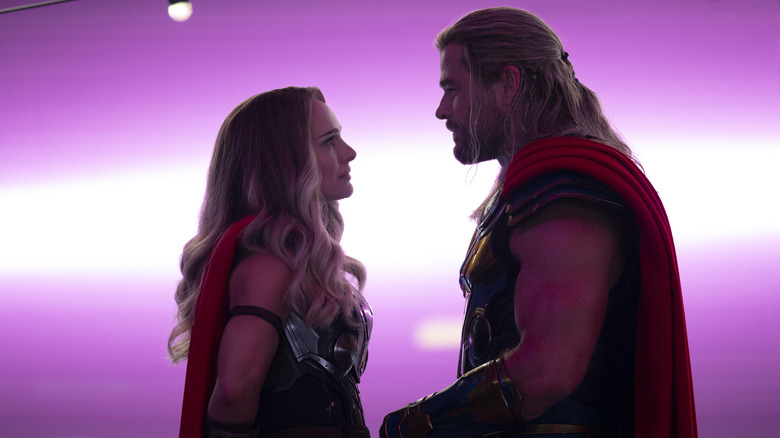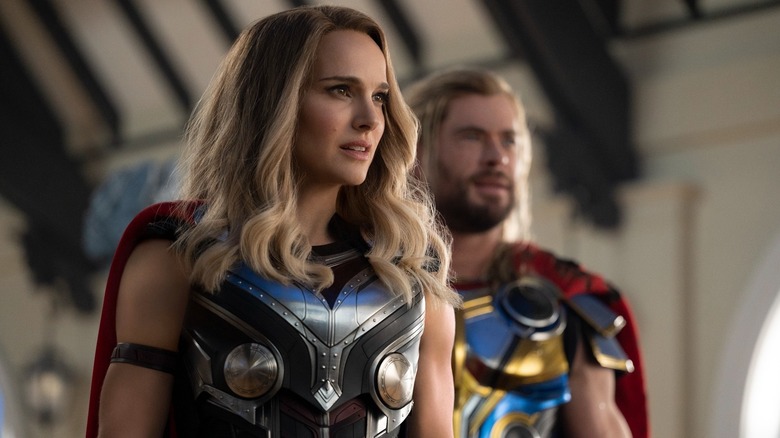Thor: Love And Thunder Ending Explained: Sweet Child O' Mine
Alright, you've seen "Thor: Love and Thunder" (or you haven't and just looooooove spoilers). Either way, it's time to take a deeper look at the ending of the movie. This is all third act discussion, so reader beware.
It should be noted that I absolutely loved the film. I get why some folks might be thrown off by the radical tonal shifts between moments that are super serious and slapstick silly, but for me that's kind of Marvel's secret sauce and one of the reasons the Marvel Cinematic Universe has been so successful. It's a series that can go between Tony Stark being kidnapped by terrorists and faceplanting while testing out his fancy new armor set. Or Yondu floating into the scene declaring he's Mary Poppins, y'all, and a few minutes later giving a tearful goodbye to his adopted son.
Point is, that's part of the ride I expect when I sit down in a theater for a new MCU movie — and that goes double when Taika Waititi is on board as director.
I bring this up because whether the third act of "Thor: Love and Thunder" works for you at all will depend on how cool you are at jumping between silly and serious. This is a segment of the movie that deals with Jane Foster's cancer, the idea that loving for a short time is better than no love at all, and a complex decision from its very effective and creepy-as-hell villain. It also happens to deal with a jealous ax and a stuffed bunny rabbit that shoots god-power laser beams out of its eyes.
Let's start with Jane Foster, as played by Natalie Portman
Jane Foster starts off the third act in rough shape. Yes, she has the power of The Mighty Thor and can wield an absolutely bonkers shrapnel-shooting version of Mjolnir, but instead of curing her stage 4 cancer, her powers are draining the remaining life from her.
Thor begs her to stay out of the final fight, not because she isn't powerful, but because the exertion will certainly push her past her limits. Yes, he could certainly use her help to rescue the stolen Asgardian children — a quest that, if he fails, means the end of him and all gods everywhere, which would throw trillions of lives into chaos and make them vulnerable to the darkness they've been protected from since the beginning of time. But even then, it's an easy choice for Thor.
It's not such an easy choice for Jane, though. It's a lot to ask of any person to sit idly by while someone they love is in danger, let alone someone that has an all-powerful hammer and super strength.
She chooses to enter into the fight, knowing it'll be her last foray. But the fate of the universe is at stake, so what the hell?
The situation for Thor is a little less complicated. Get the bad guy, don't get stabbed by the god-killing sword, save the universe. Easy-peasy, right? His journey in the film is more about letting himself be open to love again, so we'll put a pin in the God of Thunder for just a moment and circle back after we talk about Gorr the God Butcher.
One of the MCU's most complex villains
Gorr is the most interesting character for me in the whole movie. Yes, it helps that Christian Bale is extremely dedicated to making him as creepy and threatening as possible and it is very cool that a bad guy who lives in shadows takes refuge in a place where color doesn't exist so we get a really cool, stylized look to the latter half of the movie. But he's also a complex villain that is more akin to what the MCU did with Baron Zemo than a random Dark Elf baddie that we can sometimes get with the Marvel movies.
Gorr begins the movie as a true believer, a dedicated faithful follower of his god, so faithful, in fact, that he loses everything, including his young daughter. Even then, he believes in a higher power until he actually comes face to face with it and realizes his god is kind of awful. This isn't an omnipotent benevolent force, he's just an A-hole that happens to be immortal.
So, Gorr loses his religion and takes up the Necrosword, which has the ability to slay the otherwise immortal gods. You get why — if you were in this man's shoes you'd probably view your mission as righteous, too. These beings aren't to be worshipped and revered.
But there's a whole lotta gods out there for one man with a sword to take out, even if that man can pop in and out of shadows at will, so the end goal is to reach Eternity, the bizarre being at the center of the universe that will grant a single wish to the first living soul that finds it. With one wish, Gorr can eradicate all gods from the universe. That's way easier than hunting them down one by one, don't you think? Work smarter not harder, as the wise folks say.
Choosing love
The end sees Gorr triumphant. He may have lost his fancy sword, but he is the first to Eternity. He wins. The choice is up to him, and that's where I find a lot of depth to this otherwise zany movie with screaming goats and flamboyant gods.
Our hero doesn't spend the very last moments on violence. Instead, Thor tells Gorr that he isn't going to fight him, that he'd rather spend his last moments with a person he loves, which is the last thing Gorr expects from one of these selfish gods he hates so much.
In the end, the movie is about choosing love. Thor chooses to open himself up and love again. Jane Foster chooses to fight one last time knowing it will likely kill her. And then there's Gorr, who has a literal choice to make. Does he use his one wish to kill all the gods and accomplish his mission before he dies? Or does he choose love instead?
And he chooses love, bringing back his daughter from the dead and righting at least one wrong from his lifetime of zealotry.
There may be something deeper in there satirizing religious power. It's pretty clear the movie's point of view is that not everybody with godlike powers acts ... well, godlike. But Thor showing Gorr that he is caring and tender instead of just muscles and lightning causes this villain to question himself. Thor leads by example, in other words.
Love and Thunder
Now, I might question whether or not Gorr would instantly make the call and then hand his newly reborn daughter over to a god he was fighting the whole movie, but it fits thematically. Gorr starts off as a true believer, to the point that he is helpless to save his daughter from death, so when he's out of the influence of the Necrosword and sees that maybe there are some gods worth believing, he can choose to trust this deity with his daughter's life.
Jane Foster succumbs to her cancer, but she does so on her own terms, fighting for love and encouraging Thor to keep himself open to it as well. Not only did that save the day for the universe, it might have also saved Thor from himself. He was clearly lost in the wake of "Avengers: Endgame" and now he has a family to live for.
At the very end it is revealed that the "Love and Thunder" of the title are Thor's adopted daughter and the god of Thunder himself. Fitting that he loved his adopted brother so much that now he cares for an orphan himself.
As silly as this movie can be (and it gets very, very silly), the theme of "Thor: Love and Thunder" revolves around opening yourself up to love and how powerful that can be as an influence on even the darkest, most jaded of people. Love is worth fighting for, even when it hurts. Maybe especially when it hurts.
